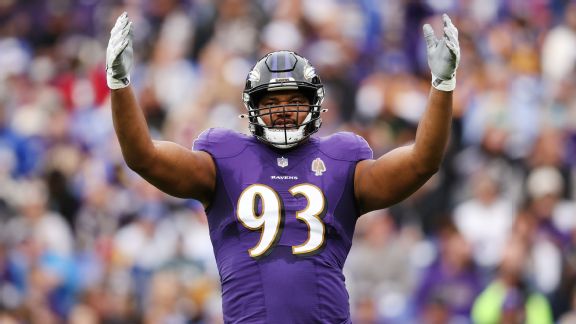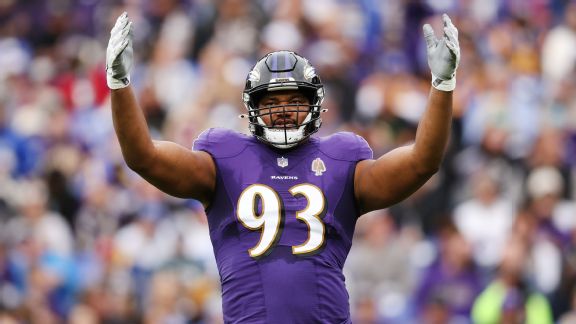
Calais Campbell never expected to join the Atlanta Falcons. The veteran defensive end didn’t know exactly what his free agent market would look like, but figured multiple franchises would show interest.
Atlanta was not on his list.
Then Campbell got on the phone with Falcons coach Arthur Smith. They spoke for about 20 minutes. Smith sold his vision for Campbell, their plans for what he and general manager Terry Fontenot are trying to build in Atlanta.
Campbell is 36 years old. He wanted to go to a place where his impact would be felt on and off the field. The call with Smith convinced Campbell to travel to Georgia for a visit.
“Then I had an in-person conversation and I could look him in the eyes and really talk to him,” Campbell said. “See his vision, his passion, and the way he communicates.
“And it was just like, wow.”
It was enough for Campbell to seriously consider Atlanta. He had a conversation with Fontenot about life, football and their journeys. He met for a long time with new defensive coordinator Ryan Nielsen and even watched tape of Atlanta’s second-year quarterback, Desmond Ridder, with coaches to get a feel for what the Falcons are trying to do. The visit turned the Falcons from a non-starter to a place Campbell felt he could be — a place he should be.
And when Campbell signed with Atlanta last week, it solidified what the Falcons have been pushing toward throughout the past month: Relevancy and becoming a place players want to come play.
Having free agency money for the first time under Smith and Fontenot helped Atlanta reconstruct its defense at every level, starting with paying safety Jessie Bates III top-end money and adding nickel Mike Hughes in the secondary, Kaden Elliss at linebacker, David Onyemata as a defensive tackle and now Campbell as a defensive end/edge rusher.
The difference between Campbell and the rest of Atlanta’s free agent moves is this: Campbell didn’t have an obvious connection to the Falcons or a need to prove himself to a team. He had a long list of suitors — he was scheduled to visit the Jets but instead decided to sign with Atlanta — and said he came close to joining another team but the club didn’t make him feel the same way the Falcons did.
That the Falcons were willing to sign Campbell, who has 99 career sacks and whose 165 tackles for loss are sixth-best in NFL history, was a sign to longtime NFL veteran that Atlanta is in position to compete now.
“The question I had to ask myself was is it gonna be this year or is it another year or two away?” Campbell said. “And based off my research and my studies, you know, I felt like it was this year. So, I gotta trust my gut.”
Part of the research was how the Falcons plan on using him. Campbell said his role would be a “true D-end,” meaning he would play on the edge on first and second downs. Campbell said the Falcons didn’t mention Cameron Jordan — Nielsen’s star defensive end when he was in New Orleans — by name, but it’s the role he envisions himself playing. Campbell also said he doesn’t expect to play more than 60% of snaps, which approximates his play percentage the last three seasons.
Nielsen hasn’t publicly explained his defense fully yet, but based on Atlanta’s free agent moves, including Campbell, there are hints of what the Falcons will attempt to do.
The Falcons have three starting-caliber safeties in Bates and last year’s returning starters, Jaylinn Hawkins and Richie Grant. How Atlanta handles its linebackers is still in question. Elliss can play multiple places, and the team has Troy Andersen and Mykal Walker returning.
The defensive front became clearer with the Campbell signing. Smith wants a deep, versatile, aggressive group. After two seasons of poor sack numbers — the Falcons’ 3.2% sacks per dropback is the NFL’s worst by 1.5% and the team’s 39 sacks since 2021 are 23 fewer than the league’s second-worst team, Las Vegas — Atlanta needed to make changes.
Adding Onyemata, Campbell and Elliss to support returners Grady Jarrett on the defensive line and Lorenzo Carter, Arnold Ebiketie and DeAngelo Malone on the edge can help.
It’s also about the message Campbell signing sends to the league. If a veteran who had a strong season a year ago is willing to sign with the Falcons, perhaps they might have a clear plan for what they are trying to build.
“This place was on par with who I am,” Campbell said. “And I think that I kind of like that underdog mentality where nobody really believes in you, nobody really gives you a chance.
“But then you see the poise, the opportunity to break out and have a big year.”












